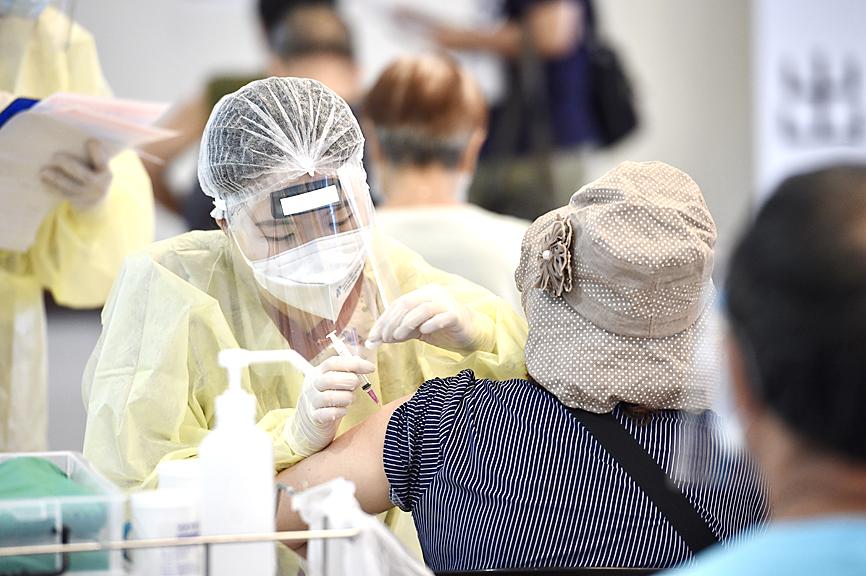Taiwan People’s Party Legislator Lai Hsiang-ling (賴香伶) yesterday urged the government to relax COVID-19 restrictions for the supplementary education and after-school care sectors, and to vaccinate workers in those industries before schools reopen in September.
Starting today, the Central Epidemic Command Center is to ease some COVID-19 restrictions on a conditional basis, although the nation remains under a level 3 COVID-19 alert through July 26.
At an online news conference, Lai said many supplementary education facilities are asking why gyms and movie theaters are being allowed to reopen, while they were not included in plans to ease restrictions.

Photo: Peter Lo, Taipei Times
Lo Ching-wei (羅靖為), a working parent in Hsinchu, said that since schools moved to online learning in May, his two children, who are enrolled in grades five and eight, have spent long periods of time on electronic devices.
Such extended use of electronic devices is harmful for their concentration and eyes, he said.
Amid high temperatures, families are also struggling with the cost of electricity, specifically for air-conditioning, he said.
As family members spend more time at home, there has also been friction among them, he said.
Lin Shuo-yan (林碩彥), another working parent in Hsinchu, said it was contradictory for the government to relax restrictions for some businesses, but not for kindergartens and other educational facilities.
“As parents, we must place importance on children’s right to education,” he said.
The suspension of in-person classes, which has been imposed for more than a month, has affected students’ lifestyles and habits, he said, adding that parents are worried about how children can readjust to school.
After-school education facilities take students’ temperatures and disinfect their premises on a daily basis, After School Educational Association representative Hsieh Chih-fang (謝智芳) said.
They can implement disease prevention measures, including maintaining a distance of 1.5m between students and setting up dividers, he said.
Unlike night markets and other places for whom restrictions have been relaxed, after-school education facilities have fixed clients, he said.
The government has reopened businesses that should remain closed, and kept closed businesses that should be reopened, he added.
If the nationwide level 3 alert is lowered after July 27, there would be no reason to keep cram schools closed, he said.
He urged the government to finish vaccinating cram school teachers against COVID-19 before the end of this month so that they can resume classes.
Summertime is peak season for cram schools, he said, adding that many elementary and junior-high school students are sent to cram schools during summer break.
Workers at supplementary education and after-school care facilities should be vaccinated as soon as possible, as students would also be returning to those facilities if schools reopen in September, Lai said.

A decision to describe a Chinese Ministry of Foreign Affairs statement on Singapore’s Taiwan policy as “erroneous” was made because the city-state has its own “one China policy” and has not followed Beijing’s “one China principle,” Deputy Minister of Foreign Affairs Tien Chung-kwang (田中光) said yesterday. It has been a longstanding practice for the People’s Republic of China (PRC) to speak on other countries’ behalf concerning Taiwan, Tien said. The latest example was a statement issued by the PRC after a meeting between Singaporean Prime Minister Lawrence Wong (黃循財) and Chinese President Xi Jinping (習近平) on the sidelines of the APEC summit

Taiwan’s passport ranked 34th in the world, with access to 141 visa-free destinations, according to the latest update to the Henley Passport Index released today. The index put together by Henley & Partners ranks 199 passports globally based on the number of destinations holders can access without a visa out of 227, and is updated monthly. The 141 visa-free destinations for Taiwanese passport holders are a slight decrease from last year, when holders had access to 145 destinations. Botswana and Columbia are among the countries that have recently ended visa-free status for Taiwanese after “bowing to pressure from the Chinese government,” the Ministry

HEALTHCARE: Following a 2022 Constitutional Court ruling, Taiwanese traveling overseas for six months would no longer be able to suspend their insurance Measures allowing people to suspend National Health Insurance (NHI) services if they plan to leave the country for six months would be abolished starting Dec. 23, NHIA Director-General Shih Chung-liang (石崇良) said yesterday. The decision followed the Constitutional Court’s ruling in 2022 that the regulation was unconstitutional and that it would invalidate the regulation automatically unless the NHIA amended it to conform with the Constitution. The agency would amend the regulations to remove the articles and sections that allow the suspension of NHI services, and also introduce provisional clauses for those who suspended their NHI services before Dec. 23, Shih said. According to

‘SIGN OF DANGER’: Beijing has never directly named Taiwanese leaders before, so China is saying that its actions are aimed at the DPP, a foundation official said National Security Bureau (NSB) Director-General Tsai Ming-yen (蔡明彥) yesterday accused Beijing of spreading propaganda, saying that Chinese President Xi Jinping (習近平) had singled out President William Lai (賴清德) in his meeting with US President Joe Biden when talking about those whose “true nature” seek Taiwanese independence. The Biden-Xi meeting took place on the sidelines of the APEC summit in Peru on Saturday. “If the US cares about maintaining peace across the Taiwan Strait, it is crucial that it sees clearly the true nature of Lai and the ruling Democratic Progressive Party (DPP) in seeking Taiwanese independence, handles the Taiwan question with extra